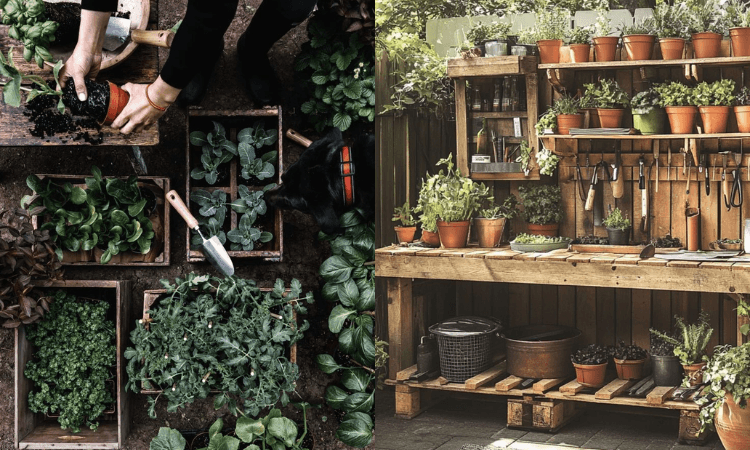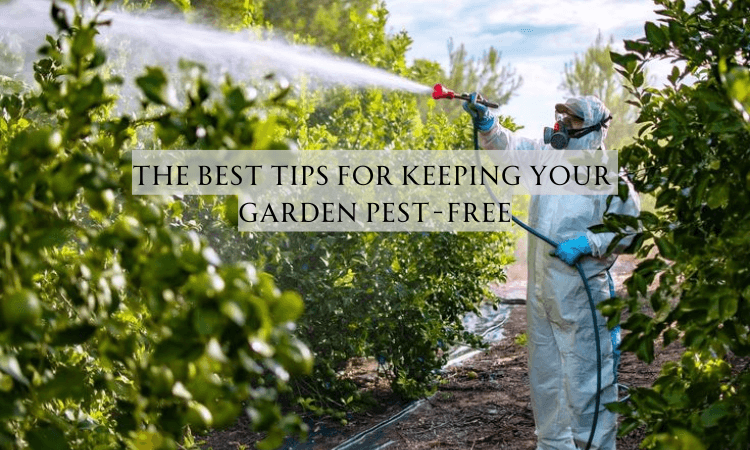Gardens are places of beauty, growth, and peace, but they can also be vulnerable to pests. Pests like insects, rodents, and even some animals can cause damage to plants, destroy flowers, and damage the crops you work hard to grow. To maintain a healthy, thriving garden, it’s essential to keep pests under control. Luckily, there are many ways to keep your garden pest-free. In this article, we will share some of the best tips and methods that will help you keep pests away naturally and without harsh chemicals.
Preventing Pest Infestation in the First Place

The best way to deal with pests is to prevent them from appearing in the first place. There are a number of simple and effective strategies that can help you keep your garden pest-free.
Choose Pest-Resistant Plants
Selecting plants that are naturally resistant to pests is one of the most effective ways to minimize problems. Many plants have built-in defenses against certain pests, making them less appealing for harmful insects.
- Some herbs, such as rosemary, mint, and lavender, are known to repel pests.
- Certain flowers, like marigolds, can discourage aphids and other insects.
- Vegetables like garlic and onions are naturally resistant to pests like aphids and slugs.
By choosing pest-resistant plants, you can reduce the need for chemical treatments and keep your garden more sustainable.
Keep Your Garden Clean and Tidy
A messy garden is an invitation to pests. Fallen leaves, debris, and weeds provide perfect hiding spots for insects and rodents. Keeping your garden tidy can help reduce pest populations.
- Regularly rake up leaves and fallen fruit to prevent pests from taking shelter.
- Remove any weeds that can attract pests or provide hiding places for insects.
- Clear up any rotting plant matter that could attract pests like snails or ants.
Regular garden maintenance and cleaning are simple but essential steps in preventing pests from settling in your garden.
Use Mulch to Protect Plants
Mulch serves many purposes in the garden, and one of the benefits is pest control. Mulch can help keep certain pests away from your plants, especially when you use organic varieties.
- Mulch can discourage slugs and snails, which dislike moving over rough textures like wood chips or pine needles.
- Mulch helps retain moisture and keeps soil temperature consistent, reducing stress on plants that might otherwise attract pests.
- Organic mulches like straw can also break down over time, enriching your soil and preventing the growth of weeds that may harbor pests.
Natural and Organic Pest Control Methods
When pests do invade, there are plenty of organic and natural ways to control them without relying on harmful chemicals. Here are some ways to deal with garden pests in a more environmentally friendly way.
Introduce Beneficial Insects
One of the best ways to control pests naturally is by introducing beneficial insects into your garden. These insects help to keep harmful pest populations in check.
Ladybugs are known for eating aphids and other small insects that harm plants. Lacewings feed on aphids, mealybugs, and other pests that can damage crops. Praying mantises are natural predators of various garden pests, including caterpillars, beetles, and flies.
Attracting these beneficial insects is easy. You can plant certain flowers like daisies, sunflowers, and fennel, which provide food for these helpful insects.
Make Homemade Pest Repellents
If pests are already present in your garden, homemade repellents can help. You can create simple, effective solutions using common ingredients to help deter pests without harming your plants.
- Garlic spray: Blend a few cloves of garlic with water, strain it, and spray it onto your plants. This works well against aphids and spider mites.
- Neem oil: This natural oil acts as an insecticide, repelling a wide variety of pests while being safe for plants.
- Soap solution: Mix a tablespoon of mild dish soap with water and spray it on plants to deter soft-bodied insects like aphids.
These homemade solutions can keep your plants safe without the need for toxic chemicals.
Companion Planting to Deter Pests
Certain plants naturally repel pests when planted together. This is called companion planting, and it can help keep your garden healthy without relying on pesticides.
Basil planted with tomatoes can help deter flies, mosquitoes, and aphids. Marigolds planted alongside vegetables like beans and tomatoes can help keep nematodes and aphids at bay. Garlic and onions are great companions for carrots and lettuce, as they can repel pests like aphids, ants, and beetles.
By planting these companion plants, you can naturally protect your garden from pests while encouraging healthy plant growth.
Chemical-Free Solutions for Pest Management
If you prefer to avoid chemicals entirely, there are a number of alternative solutions that can help keep pests at bay. Here are a few chemical-free methods that are safe for your garden.
Use Diatomaceous Earth
Diatomaceous earth is a natural substance made from the fossilized remains of tiny aquatic organisms. It works by damaging the exoskeletons of insects, leading to dehydration and death.
- Diatomaceous earth can be sprinkled around the base of plants or directly onto pests to control insects like ants, beetles, and slugs.
- It’s safe for beneficial insects and won’t harm plants when used properly.
- Be sure to use food-grade diatomaceous earth, as other types may be harmful to humans or pets.
This non-toxic solution can be very effective, especially for controlling pests in the soil and around your plants.
Introduce Nematodes to Control Soil Pests
Nematodes are tiny, microscopic worms that can be used to control soil-dwelling pests like grubs and root-feeding insects. They are harmless to humans and plants but deadly to pests.
- Nematodes work by entering the pest’s body and releasing bacteria that kill the pest.
- They can be applied to the soil where pests are active, such as around root zones or in areas with a high concentration of pests.
- Nematodes target specific pests, so be sure to select the right type for your garden’s needs.
By introducing nematodes into your soil, you can control pests without harming your plants or the environment.
Regular Garden Maintenance
Ongoing care and attention are essential for keeping your garden pest-free. Regular maintenance helps prevent infestations and allows you to catch problems early.
Inspect Plants Regularly for Signs of Pests
Regularly checking your plants for signs of trouble is crucial. Look for holes in leaves, discolored spots, or sticky residue, which may indicate pest activity. Check the undersides of leaves, as pests like aphids and spider mites often hide there. Droppings or webs could also signal the presence of pests like caterpillars or spiders. Early detection will help prevent significant damage to your plants.
Prune Dead or Damaged Leaves
Pruning is important for keeping plants healthy and free from pests. Removing dead or decaying leaves eliminates breeding grounds for insects and helps prevent the spread of pests. Cutting back any infected or damaged parts can also stop pests from spreading further. Additionally, trimming dense growth improves air circulation, reducing the likelihood of pest problems like aphids or mildew.
Rotate Crops Each Season
Crop rotation is a simple and effective way to avoid pest buildup in your garden. By changing the location of plants each year, you can disrupt the life cycles of pests and prevent them from establishing a presence. Avoid planting the same types of plants in the same spot every year, as this can lead to pest and soil health issues. Crop rotation helps maintain soil fertility while minimizing the risk of pest problems.
Conclusion
Keeping your garden free of pests is an ongoing process, but by following these simple, effective tips, you can enjoy a healthier, thriving garden without relying on harmful chemicals. Prevent pests from infesting your garden by selecting pest-resistant plants, keeping your garden tidy, and using organic pest control methods. Regular maintenance, such as inspecting plants and pruning, will also help keep pests at bay. By using these strategies, you can ensure your garden stays pest-free and continues to grow and flourish for years to come.




